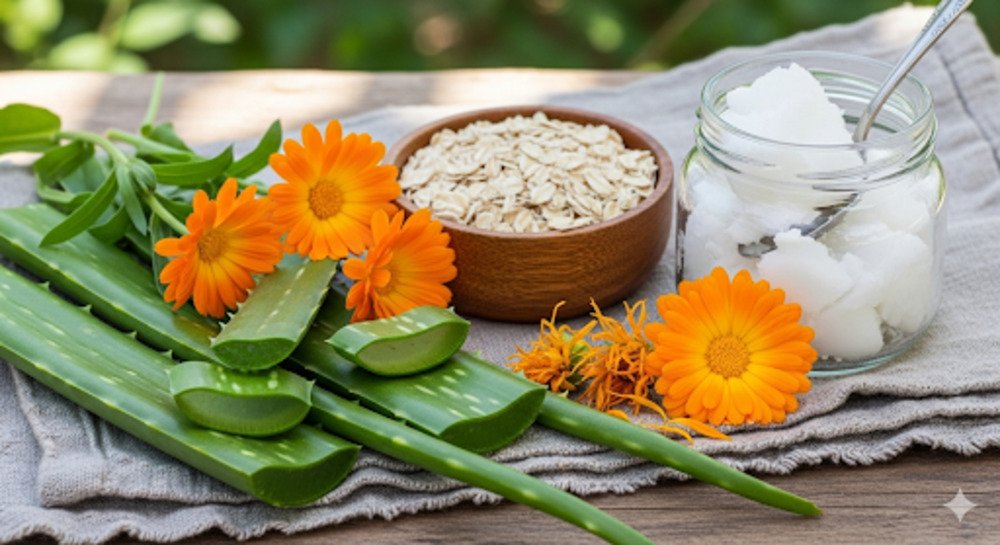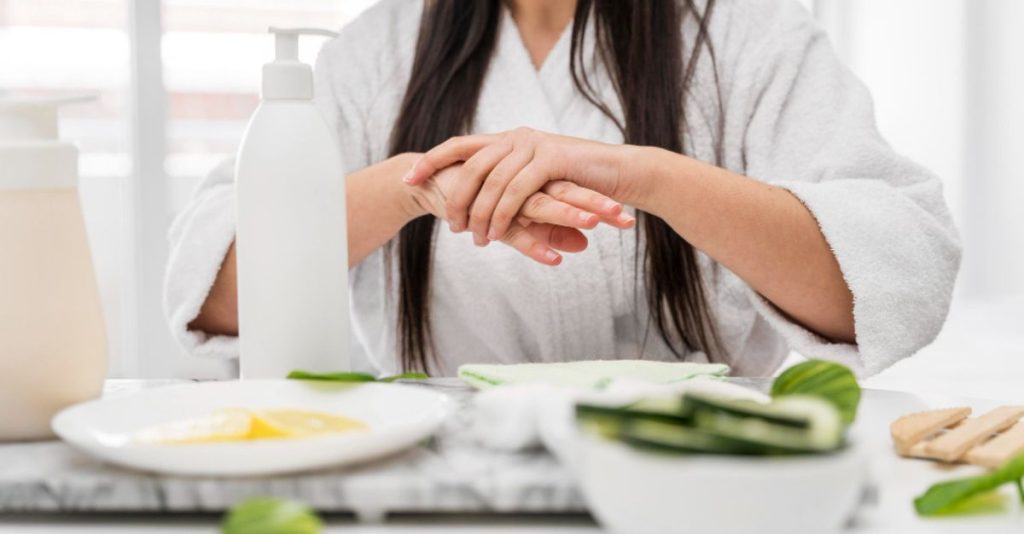Eczema can be a persistent and uncomfortable condition, but natural remedies for eczema provide a soothing alternative to conventional treatments.
Many people are discovering the benefits of herbs for eczema, which offer calming and healing properties without harsh side effects.
Embracing natural eczema treatment means working in harmony with your skin to reduce flare-ups and support long-term health. In this guide, explore seven science-backed remedies that bring gentle, effective relief straight from nature’s pharmacy.
For those in Malaysia looking for natural skincare malaysia and gentle skincare products, Yagishi offers holistic options crafted for sensitive skin.
Why Choose Natural Eczema Treatment Over Conventional Medicine?

It’s a smart move, for going natural when it comes to eczema treatment. The shift towards holistic skincare represents a return to gentler, more sustainable approaches that support long-term skin health.
Key benefits of natural remedies for eczema:
- Gentle yet effective: Natural treatments support your skin’s barrier function without harsh side effects that can worsen sensitivity over time
- Long-term benefits: Unlike some conventional treatments, natural remedies help prevent the dreaded rebound effect where symptoms return with a vengeance
- Holistic approach: Address root causes like inflammation, gut health, and environmental triggers, not just surface symptoms
- Fewer complications: Lower risk of dependency and adverse reactions compared to stronger pharmaceutical options
- Cost-effective: Many natural ingredients are readily available and affordable for ongoing use
The beauty of natural eczema treatment lies in its ability to work harmoniously with your body’s healing processes, strengthening your skin’s resilience rather than suppressing symptoms temporarily.
7 Powerful Natural Remedies for Eczema

Ready to discover nature’s most effective solutions for soothing irritated skin? These seven research-backed remedies have helped countless people find relief from eczema symptoms, offering gentle yet powerful alternatives to harsh treatments.
1. Colloidal Oatmeal: Your Skin’s Best Mate
Think of colloidal oatmeal as a warm hug for irritated skin. This finely ground oat powder releases natural compounds called avenanthramides that soothe inflammation and lock in moisture like a protective barrier.
- How to use: Add a cup to lukewarm bathwater and soak for 15-20 minutes. The milky water will coat your skin with healing compounds. For targeted relief, create a paste with water and apply directly to affected areas, leaving on for 10-15 minutes before gently rinsing.
- Why it works: Colloidal oatmeal contains beta-glucan, a natural moisturising agent that helps repair damaged skin barrier function. It’s particularly effective for reducing that maddening itch that keeps you awake at night.
- Top tip: Always use actual colloidal oatmeal rather than regular porridge oats.The particle size matters for maximum skin benefits.
2. Pure Aloe Vera Gel: Nature’s Cool-Down Treatment
When your skin feels like it’s on fire, aloe vera provides instant relief. Its cooling properties and natural healing compounds make it a go-to home remedy for eczema that’s been trusted for centuries.
- How to use: Apply fresh aloe vera gel directly to clean, damp skin to lock in moisture. For best results, pair it with gentle cleansers like those found in quality skincare ranges that won’t strip your skin’s natural oils.
- The science: Aloe vera contains over 75 potentially active compounds, including vitamins, enzymes, and amino acids that work together to reduce inflammation and accelerate healing.
- Pro tip: Always choose pure, organic aloe vera gel. Skip the neon-coloured versions filled with additives that can actually irritate sensitive skin further.
3. Evening Primrose Oil: A Natural Supplement for Eczema Relief
This golden oil is rich in gamma-linolenic acid (GLA), an omega-6 fatty acid that tackles inflammation from the inside out. Evening primrose oil represents a unique approach to eczema treatment that addresses systemic imbalances.
- How to use: Evening primrose oil can be taken as supplements for eczema (consult your GP first) or applied topically when diluted with a carrier oil like jojoba or sweet almond oil.
- The benefits: Regular use may help reduce the severity of flare-ups, especially those triggered by hormonal fluctuations. Many people notice improvements in skin texture and reduced itching after 6-8 weeks of consistent use.
- Safety note: Always patch test topical applications and consult healthcare professionals before starting any supplement regime, particularly if you’re pregnant or taking other medications.
4. Calendula: The Gentle Warrior
Derived from marigold flowers, calendula has been used for centuries to heal wounds and reduce inflammation. It’s particularly brilliant for sensitive skin types, including children’s delicate skin.
- How to use: Look for calendula-infused creams, oils, or salves. Apply gently to affected areas 2-3 times daily. You can also make your own by infusing dried calendula flowers in carrier oil for several weeks.
- Why it’s special: Calendula works without the sting or burn associated with some treatments, making it perfect for those with extremely sensitive skin who can’t tolerate stronger remedies.
5. Apple Cider Vinegar: The pH Balancer
An apple cider vinegar bath for eczema can help restore your skin’s natural acidic balance and fight harmful bacteria. This traditional remedy has gained scientific backing for its antimicrobial effects.
- How to use: Always dilute properly, to the one part vinegar to ten parts water. Add about a cup to lukewarm bathwater and soak for 10-15 minutes, or use the diluted mixture as a gentle toner applied with a cotton pad.
- The science: Healthy skin maintains a slightly acidic pH (around 5.5), but eczema-prone skin often becomes too alkaline, creating an environment where harmful bacteria like staphylococcus aureus can thrive.
- Important: Never use undiluted vinegar on your skin. It can cause chemical burns and worsen inflammation!
6. Manuka Honey: Sweet Relief
This medical-grade honey from New Zealand boasts incredible antibacterial properties thanks to its unique compound methylglyoxal (MGO). It’s like having a pharmacy in a jar.
- How to use: Apply a thin layer of medical-grade Manuka honey directly to affected areas. You can cover with a sterile dressing if needed. Leave on for several hours or overnight, then rinse gently with lukewarm water.
- The magic: Manuka honey creates a protective barrier that seals moisture into your skin whilst actively promoting healing and fighting infection. Look for honey with a UMF (Unique Manuka Factor) rating for guaranteed potency.
7. Coconut Oil for Eczema: The Multi-Tasker
Virgin coconut oil acts as both moisturiser and antimicrobial treatment. Its natural compounds can help reduce the presence of staphylococcus aureus bacteria often found on eczema-prone skin.
- How to use: Apply coconut oil to slightly damp skin to enhance absorption. It’s solid at room temperature but melts beautifully on contact with warm skin. Use daily as part of your moisturising routine.
- The benefits: Coconut oil contains lauric acid, which has natural antibacterial and anti-inflammatory properties. It’s particularly effective for maintaining skin hydration between flare-ups.
Daily Skincare for Eczema Treatment: Gentle, Natural Care That Works
Whilst these natural remedies work wonders, your daily skincare routine is equally crucial. That’s where products like the Yagishi Premium Goat Milk Body Care, this skincare set offers a perfect foundation for your natural treatment approach.
a. Why goat milk matters:
Goat milk contains natural lactic acid that gently exfoliates dead skin cells whilst maintaining optimal pH levels. It’s rich in vitamins A, B6, B12, and E, plus essential fatty acids that nourish and repair damaged skin barriers. Hydrate with goat milk body lotion to calm flare-ups while nourishing sensitive skin barriers.
b. Enriched with:
- Nourishing goat milk – Provides gentle hydration without irritation
- Skin-strengthening ceramides – Help rebuild damaged skin barrier function
- Soothing aloe vera – Offers immediate cooling relief
- Gentle botanical extracts – Support natural healing processes
This thoughtfully formulated set transforms your daily cleansing and moisturising routine into acts of healing self-care, perfectly complementing your natural eczema treatment approach without interfering with other remedies.
Explore skincare for eczema prone skin that complements natural remedies and helps protect sensitive skin daily
Beyond Topical Treatments: Eczema Treatment at Home
Lifestyle tweaks that make a real difference:
1. Dietary Modifications
- Reduce inflammatory foods: Cut back on processed sugars, refined carbohydrates, and foods high in omega-6 oils
- Increase omega-3 rich options: Include fatty fish, flaxseeds, chia seeds, and walnuts in your diet
- Consider elimination diets: Common triggers include dairy, gluten, and eggs—work with a healthcare professional to identify your personal triggers
- Stay hydrated: Aim for 8 glasses of water daily to keep skin cells plump and functioning optimally
2. Environmental Controls
- Smart bathing: Keep baths short (10-15 minutes) and lukewarm, avoid sodium lauryl sulfate in products
- Home environment: Use a humidifier to maintain 40-50% humidity, especially during winter months
- Choose gentle products: Select fragrance-free detergents and fabric softeners
- Clothing choices: Opt for breathable fabrics like cotton and bamboo, avoiding rough textures
3. Stress Management
Stress is a major eczema trigger, so incorporating relaxation techniques is crucial:
- Practice mindfulness meditation for 10 minutes daily
- Try gentle yoga or tai chi
- Ensure adequate sleep (7-9 hours nightly)
- Consider counselling if stress is overwhelming
A holistic approach that combines dietary changes, environmental controls, and stress management is key to effectively treating eczema from the inside out. Switch to a body wash for sensitive skin that avoids harsh surfactants and supports your skin’s natural balance.
When Natural Remedies Aren’t Enough
Whilst these best natural remedies for eczema are incredibly effective, sometimes you need professional medical guidance. Don’t hesitate to see your GP if you notice:
- Signs of infection: Pus, increased warmth, red streaks, swollen lymph nodes, or fever
- Worsening symptoms: Eczema spreading despite treatment or becoming more severe
- Quality of life impact: Sleep disruption, work/school problems, or emotional distress
- Unusual presentations: Sudden onset, unusual locations, or symptoms that don’t match typical eczema patterns
Remember, natural treatments can work alongside conventional medicine when needed.
Conclusion
Natural remedies for eczema, from colloidal oatmeal baths to coconut oil applications, offer gentle yet effective relief when used consistently. Pairing them with a simple daily skincare routine helps strengthen your skin barrier and reduce flare-ups over time.
If you’re ready to explore eczema-friendly, natural skincare in Malaysia, contact Yagishi to discover gentle, hypoallergenic solutions designed for sensitive skin.

